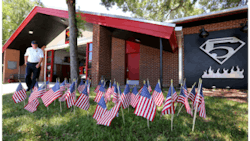Ringtones Signal Memories of Pulse Massacre Responders
When first responders went into Pulse nightclub to retrieve victims' bodies from the floor, a symphony of familiar ringtones met their ears.
They knew each ring meant families of the dead were desperately trying to reach their loved ones after learning of the mass shooting. Nearly two weeks later, hearing those sounds can still bring some of them back to the scene. Local EMT trainer Jason Marquez said one of his friends who was inside the club even changed his ringtone so he didn't go back to the place of horror with each phone call.
As Orlando heals in the wake of the June 12 mass shooting, first responders are coping with the aftermath of what they saw that day. Through counseling, workplace support and leaning on friends and family, the community's caretakers are caring for themselves in many ways.
Marquez, a 9/11 first responder who moved to Florida to open a school for EMT and paramedic certification, said after a traumatic event is done and the adrenaline subsides, reality hits.
"EMTs respond to calls that are traumatic every day. When that happens, muscle memory kicks in -- you're not processing what you're seeing," Marquez said. "But then the shift ends."
To help employees cope, the Orlando Fire Department, Orange County Fire Rescue and the Orlando Police Department held Critical Incident Stress Management sessions within 72 hours of the shooting.
CISM is led by mental health workers and trained CISM firefighters who help coworkers talk about what happened, their feelings and offer support to one another, OCFR wellness coordinator Lt. Anthony Willis said. They also talk about crisis symptoms and where to go if they need additional help.
Willis said his CISM and peer support team reported to the fire stations the morning after the event and held a debriefing for the Pulse responders the day after.
"We give rapid care to get our firefighters back to normal quickly so they can get back to work," Willis said.
Willis said support is critical to prevent downward spirals. According to the firefighter behavioral health alliance, there were 117 firefighter suicides in the U.S. last year and 57 so far in 2016. First responders are among the professions with the highest suicide rates, said Rick Barton, spokesman of the International Critical Incident Stress Foundation, Inc. that trains first responders in CISM.
"It's very important we keep an eye on our firefighters as we move forward. We can't afford for anyone to commit suicide," Willis said. "We're in the business of saving lives, not taking them."
Barton said CISM encourages first responders not to bottle up their emotions.
"It's relatively new getting first responders to talk about what bothers them. The culture is 'I can handle it, I've got this,'" Barton said. "You can be tough and rugged, but how rugged is your psychology?"
Even when U.S. Attorney General Loretta Lynch spoke with first responders during her recent Orlando visit, she encouraged them to focus on self care, OFD spokeswoman Ashley Papagni said.
But the care can't stop after the last CISM session. Willis said his team will continually offer support as time goes on.
Marquez, who began his EMS career withNew York City Emergency Medical Services just a year before 9/11, said the pain of witnessing highly traumatic events remains long after the last rescue for first responders.
"It's sensory overload," Marquez said. "Everywhere you look you're reminded of it. In the news, on '#OrlandoStrong' T-shirts, at memorials."
While CISM works, family is important in the healing process as the weight of the memories can come down hard once a first responder leaves the workplace, Marquez said.
"Those debriefings are great, but what happens when you go home?" Marquez said. "After 9/11, I worked more. I wanted to stay focused. When I went home is when I felt that wrath of what was going on."
For OFD Lt. David Odell Jr., his wife and children keep him grounded. After working the shooting from start to finish, he came home to ride bicycles with his kids.
"That was the best bike ride I ever had," Odell said. "You just went from the largest and most chaotic scene of your career to 'Hey, Daddy's home.' "
Ultimately, Willis said the Pulse first responders are healing and back at work. Willis said he is impressed with how strong the local firefighters and other first responders have stayed in the aftermath.
"Under the circumstances, they're doing very well. It's a healing process and everyone is recovering in their own way," Willis said. "I'm proud to say our firefighters are resilient. I want the people in our community to be proud and let them know we're ready to go back to work again."
[email protected] or 407-650-6931
———
©2016 The Orlando Sentinel (Orlando, Fla.)
Visit The Orlando Sentinel (Orlando, Fla.) at www.OrlandoSentinel.com
Distributed by Tribune Content Agency, LLC.
